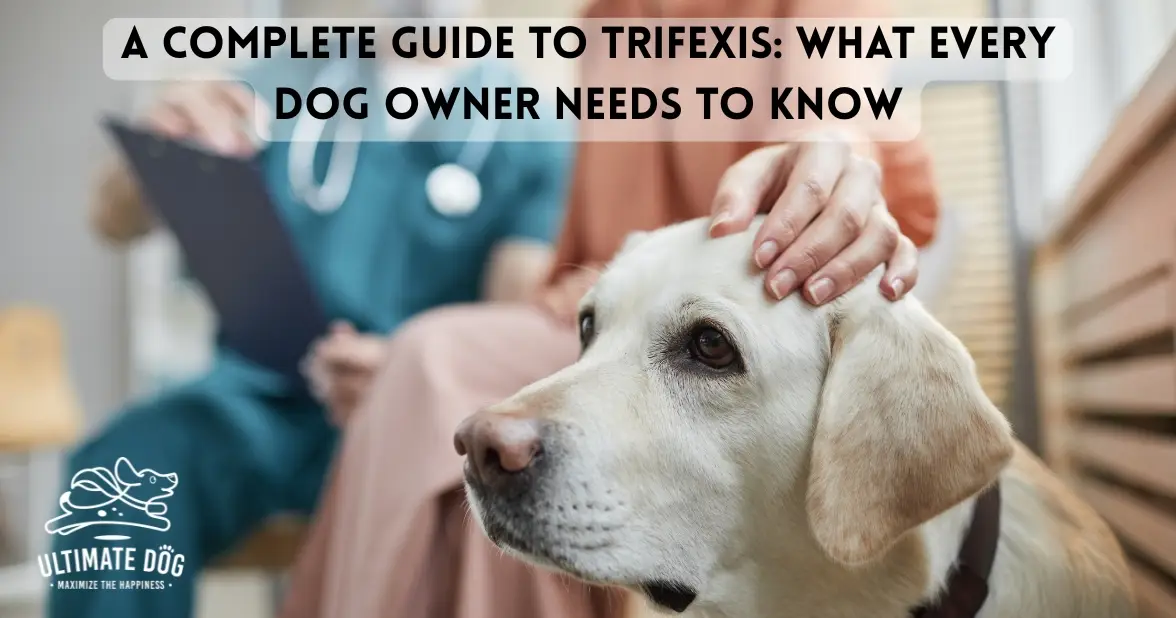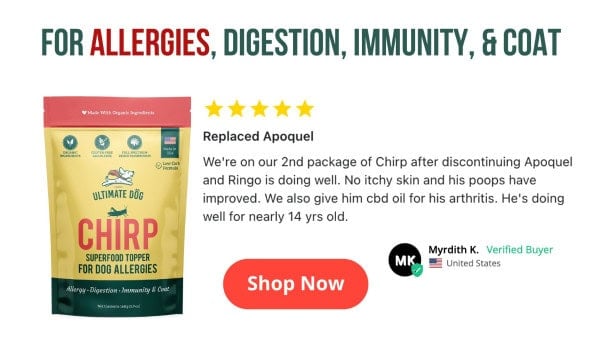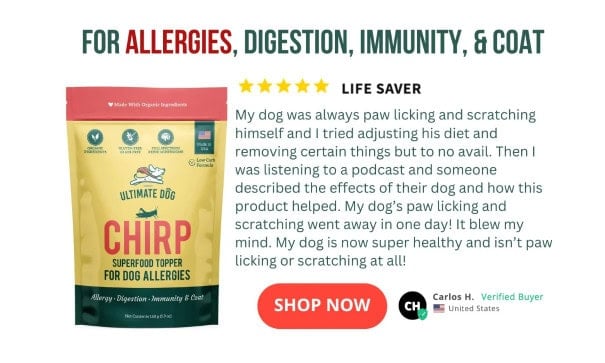So, your vet has recommended you start your dog on Trifexis. Maybe you wanted an easy way to control fleas or were worried about heartworm disease. Your vet gave you a great sales pitch about how this one pill can prevent numerous parasite infections and keep your dog safe.
But you’re a smart consumer, and you know things that sound too good to be true usually are. And when it comes to Trifexis for dogs, you’re right. This antiparasite treatment comes with a lot of side effects. But that’s not the only reason we don’t recommend using it.
Keep reading to discover what Trifexis is, how it works, its side effects, and why this isn’t the best way to keep your pet parasite-free.
What Is Trifexis for Dogs?
Trifexis is a once-monthly pill made by Elanco Animal Health Incorporated. It is available by prescription only and is meant to treat and prevent fleas, heartworms, and intestinal worms. Many veterinarians prescribe it for year-round use.
The Trifexis monthly pill is a beef-flavored chewable designed to be easy to administer and marketed as a single solution that “kills fleas and prevents flea infestations, prevents heartworm disease, and treats and controls adult hookworm, roundworm, and whipworm infections.”
The problem? Most dogs do not experience flea, heartworm, and intestinal worm infestations on a monthly basis—so why treat them for all of these parasites every month, all year long? We’ll dig deeper into this issue later.
Trifexis Ingredients
Trifexis contains two active ingredients: spinosad and milbemycin oxime. Both of these pesticides target parasites’ nervous systems to kill them and prevent infestation.
Spinosad
Spinosad is an organically derived pesticide that activates the nicotinic acetylcholine receptors in adult fleas, causing system overload, seizures, and eventual death.
As a drug, spinosad is considered relatively safe. However, it is a potent P-gp inhibitor in canines, causing neurotoxicity when taken with certain other drugs, including ivermectin.
Ivermectin is a heartworm treatment closely related to milbemycin oxime, the second active ingredient in Trifexis.
Milbemycin oxime
This active ingredient functions by binding to chloride channels of nerve and muscle cells in parasitic worms, causing tissue paralysis and effectively killing these parasites.
Mibemycin oxime is a macrocyclic lactone and is similar in structure and function to ivermectin. While the latter is effective against adult heartworms, mibemycin oxime is largely only effective at killing heartworm microfilariae (larvae).
It is important to note that many heartworm strains have developed resistance to this pesticide and are not affected by it.
Trifexis Dosage for Dogs
Trifexis is approved for dogs over 5 pounds and those older than 8 weeks of age.
The dose is weight-dependent, and the product is available in five color-coded boxes, each containing a dose specific to a different weight class. High doses of spinosad have the potential to cause long-term damage, so it is important to use the right product for your dog’s size if you choose to administer Trifexis.
Side Effects
Trifexis side effects range from mild to moderate in most cases.
According to the package, Trifexis reactions include:
- vomiting
- decreased activity
- itching
- decreased appetite
- diarrhea
- dermatitis
- skin reddening
- ear flap reddening
Side effects, especially vomiting, are more common in dogs under three months old. Dogs being treated with additional pesticide medications, especially ivermectin, certain breeds, and dogs with seizure disorders, are at a higher risk of developing neurological symptoms, including ataxia, convulsions, and uncontrolled trembling.
At various times, customers have brought complaints and lawsuits against Elanco with claims that Trifexis caused serious side effects, including death. These findings are yet unsubstantiated, according to the courts.
However, early research on low-dose spinosad ingestion in dogs found that after one year of use, most dogs showed effects on glands and immune cells and increases in certain blood proteins and fats. Long-term rat and rabbit studies of this active ingredient have shown side effects, including low body mass, organ damage, and pregnancy loss.
Our Argument Against Using Trifexis
There are certainly risks to using Trifexis, but the same can be said for just about any antiparasitic medication. The reason I caution people against using Trifexis and other board-spectrum pesticide medications is because they require you to give your dog drugs they probably don’t need.
It is certainly possible for a dog to have simultaneous flea and intestinal worm infestations while being at risk for heartworm. However, once a well-cared-for domestic dog is treated for worms and fleas, it is unlikely that it will need treatment for both again the next month. And they certainly do not need treatment for fleas, worms, and heartworms every month all year long.
To understand why, let’s look at the likelihood of infestation and the risks of fleas, heartworms, and internal parasites throughout the year.
Flea Infestations in Dogs
Fleas are most likely to be a problem for dogs during warm, humid months. Depending on where you live, this might mean that your dog is at risk for flea infestation only during the late spring and early fall. In other places, the risk might remain high from early spring to late fall. In very few locations—at least in the US—do dogs require flea treatment during the winter.
However, flea preventatives are often recommended in the winter “in case fleas are active and thriving inside your house.” If this is the case, your money and energy are much better spent getting your home treated and the infestation eradicated rather than repeatedly treating your dog for fleas just so they can get them again and again because the source of the infestation is not being addressed.
Heartworm in Dogs
Heartworm is spread to dogs by mosquitoes. These flying nuisances like it warm. Hardy species first become active when temperatures rise consistently above fifty degrees overnight. However, mosquitoes are most active during warm summer months when temperatures are above 80 degrees.
Some areas have a much higher prevalence of heartworm disease than others. Similarly, dogs who spend almost all their time indoors are going to have a lower chance of getting infected than, say, a dog who lives in an outdoor kennel.
There are a few isolated places in the US where mosquitoes are active year-round. But most of us get breaks from these disease-spreading creatures during the winter months, at the very least.
Dogs and Internal Parasites
Most vets will tell you that internal parasite risk is high all year long. But, thanks to studies like this one from Penn State, we know this isn’t actually the case.
Researchers here found that many intestinal worms are sensitive to cold and heat, and infection risk is high only when temperatures are between 46 and 64 degrees. Stomach-residing worms, on the other hand, care less about temperature and more about humidity. These little worms are most likely to infect when humidity levels are over 90%.
But the much more important risk factor to consider when it comes to internal parasites is your dog’s environment. Dogs who live primarily indoors and are limited to leashed walks and a fenced yard have a very low chance of ingesting parasites (especially if they are flea-free). On the other hand, dogs who have access to the open property, go camping or off-leash hiking or swim in natural water bodies are more likely to get parasites.
Bottom Line: These Three Issues Should Not be Treated with One Pill
For the majority of dogs, the risk of getting fleas, ingesting parasites, or getting heartworm are vastly different at various times throughout the year. So why would you treat all three with a single pill?
For example, I live in Colorado, which is a fairly high elevation with two dogs. Our heartworm risk is moderate, and mosquitoes are only active during the summer and early fall. Fleas are only active in the rainy spring months; otherwise, the humidity is too low. And I only have to worry about my dogs consuming parasites when we go camping, usually during the summer months. For me and many other dog owners, treating these three issues with a single monthly pill makes no sense at all.
Rather than use one double-drug pill year-round to fight issues that are only a problem at specific times—and rarely a problem at the same time—why not save money and reduce the number of drugs you have to give your dog by only treating what they are at risk of getting when they’re at risk of getting it? (Or better yet, opt for a non-drug alternative—more on that next.)
Trifexis Alternatives
Unless you live in the Deep South, where it is almost always warm and humid, and your dog spends most of their time outdoors, there really is no good reason to treat fleas, worms, and heartworms at the same time, all the time.
Instead, I recommend finding a more targeted, safer medication for whichever issue your dog is at risk for that month. Doing so will reduce the amount of chemicals you have to put in your dog’s body and ensure the chemicals you do give them are actually serving a purpose.
Sometimes medications are necessary, but often, there are natural remedies that are just as effective or, in the case of prevention, more effective than prescription drugs. We’ll look at both options below.
Alternative Medications
If your dog is at high risk for any of the parasites Trifexis targets and you can’t control their environment to reduce their risk, then using a preventative medication may be necessary. Active infections that cannot be controlled through alternative means may also require drugs.
For heartworm prevention, your best bet is Heartguard (original, not Plus), which only contains ivermectin without any other active ingredients. While not without its pitfalls, this drug has been used for decades, is effective, and is relatively safe for most dogs (with some breed and health exceptions).
For intestinal parasites, there are a number of deworming products available. The best approach is to identify the type of worm your dog has and treat them with a single-drug medication that is effective against that type. Monthly intestinal worm prevention drugs are almost always unnecessary, as infections only need to be treated when present. Cleaning and controlling your dog’s environment is the best prevention for reinfection.
Safe flea treatments are a bit trickier to find. Oral treatments are more effective than topical treatments but tend to have more side effects. Topical treatments, on the other hand, carry a higher risk of contaminating the environment—you and your children being part of that environment. Luckily, many natural treatments and remedies are effective at treating and preventing fleas.
Safe and Natural Alternatives
We’ve talked at length about natural flea treatments, the safest ways to prevent heartworm, and natural dewormers in past articles. Here, I’ll give a quick breakdown of some of the best natural alternatives to Trifexis and other antiparasitic drugs.
Fleas:
- Bathe your dogs with natural shampoo to kill and remove fleas from their coat
- Use diatomaceous earth to treat flea infestations in your home and yard
- Wash all bedding in hot water
- Add garlic and brewer’s yeast to your dog’s meals to help repel fleas
- Be proactive and bathe your dog weekly during flea season
- Feed a biologically appropriate diet high in b-vitamins to support your dog’s own defenses
Heartworm:
- Understand your local risk and what times of year that risk is highest
- Use pet-safe, natural mosquito repellent and avoid active mosquito environments
- Add garlic and brewer’s yeast to your dog’s meals to help repel mosquitoes
- Speak to your holistic vet about safe and natural monthly internal parasite cleanses
- Get heartworm tests done regularly
- Feed a biologically appropriate diet to support your dog’s natural defenses
Internal Parasites:
- Control your dog’s access to natural bodies of water, areas where wildlife frequents, animal droppings, and dead animals.
- Consider natural dewormers, such as pumpkin seeds, garlic, or neem oil
- Speak to your holistic vet about safe and natural monthly internal parasite cleanses
- Add apple cider vinegar or chamomile to your dog’s meals to prevent parasites
- Feed a biologically appropriate diet to support your dog’s natural defenses
Hopefully, you noticed the recommendation common to all three of these parasite issues: Feed a biologically appropriate diet.
By giving your dog everything they need, nutritionally speaking, through a fresh or raw, high-protein, biologically appropriate diet, you can set them up to protect themselves against many of the pests that plague pets.
Dogs who eat a quality diet are healthier and better able to fight off infections and infestations than dogs whose immune systems are hampered by subpar nutrition.
Final Takeaway
When it comes to battling fleas, worms, and heartworms, Trefixis is an easy choice, but one that comes with many side effects and exposes your dog to far more chemicals than necessary.
Instead, I recommend treating these issues on an as-needed basis using safer, targeted medications or, better yet, natural alternatives.
Sources
Dunn, S. T., Hedges, L., Sampson, K. E., Lai, Y., Mahabir, S., Balogh, L., & Locuson, C. W. (2011). Pharmacokinetic interaction of the antiparasitic agents ivermectin and spinosad in dogs. Drug Metabolism and Disposition, 39(5), 789–795.
Brooks, Wendy, DVM. (2023, April 11). Heartworm Preventive Comparison Chart for Dogs and Cats. Veterinary Partner.
Kleszynski, B., DVM. (2025, May 9). How do dogs get fleas? PetMD.
Lynn, R. C., & Duquette, R. A. (2021). Georgis’ Parasitology for Veterinarians (11th ed.).
Bunch, T. R.; Bond, C.; Buhl, K.; Stone, D. 2014. Spinosad General Fact Sheet; National Pesticide Information Center, Oregon State University Extension Services.
Temperature and humidity may drive future transmission of parasitic worm infections | Penn State University. (n.d.).
Trifexis® – treatment for fleas and heartworm disease for dogs. Elanco.

Sara Seitz worked in the pet industry for over a decade. In addition to being a certified dog trainer, Sara gained experience working as the general manager of a dog daycare and boarding facility, as the creator and manager of a pet sitting company, as a groomer, and as a dog behavior evaluator. She also has a bachelors in animal behavior from CSU. Currently, Sara works as a freelance writer specializing in blog, article and content writing.





Leave a Comment